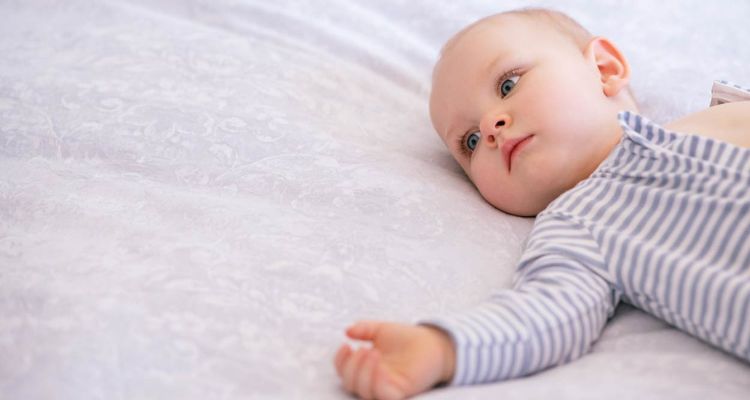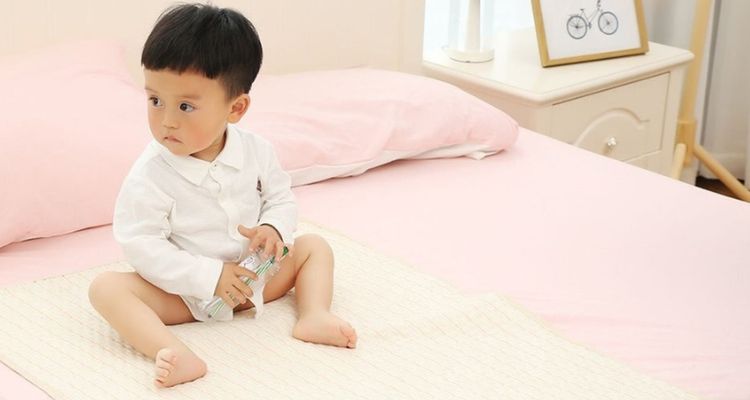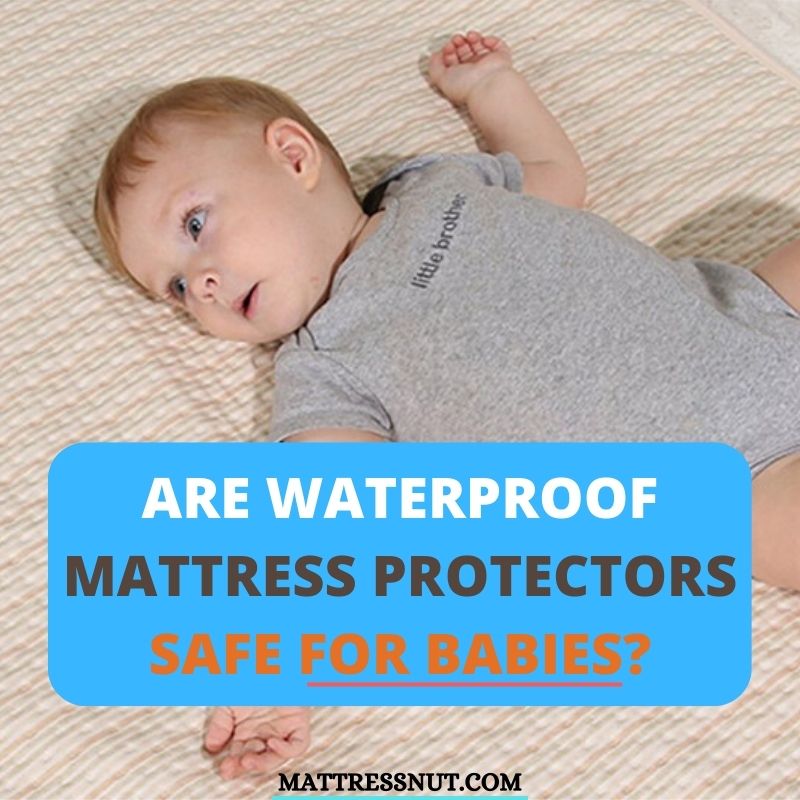Waterproof mattress protectors are great for bed-wetting children (check the top rated waterproof protectors). But the recent hype is that they are something great for babies. A waterproof mattress protector ensures a comfortable night’s sleep for your baby. It protects against any accidents or leaks that may occur at night.
But are they safe to use? Are they beneficial, or will they be a hazard?
Let us take a look.
Do I Need A Baby Mattress Protector?
As a parent, you want to grab everything that keeps your baby healthy, cheerful, and safe. A baby mattress protector is one way to help keep your baby safe and calm.

Mattress protectors are like covers for the mattress placed on the crib or the bed. They keep the mattress clean and safe and provide a safe and sound setting for the baby.
Sometimes people refer to them as mattress pads. Mattress pads are usually an extra comfort layer for the actual mattress. If they are breathable and waterproof, they serve the purpose of a protector.
A baby mattress protector is a thin, waterproof sheet that goes over the mattress. Since it is waterproof, it helps to keep it clean from spills and accidents. If you’re concerned about your baby’s safety, a baby mattress protector is a good option since it’s easy to wash.
You can dust it off, wipe it down with a disinfectant and wash it numerous times. It is a great tool to ensure your baby’s bed is clean and free of dust and other allergens.
Are Mattress Protectors Safe For Newborns?
How reliable mattress protectors come second to how safe they are for newborns. Safety is essential regarding health, toxins, physical, and every other aspect. Especially if it involves newborns. The parents become more curious, careful, and skeptical about every little thing. A mattress protector poses a great addition to the bed. It has its unique benefits, but it should be safe to use.
With the increasing demand, mattress protector manufacturers are making significant progress. The mattress protectors are of natural and organic material or non-allergenic covers (check the top rated organic mattress protectors). This ensures the babies sleeping on them are safe from chemicals that some may use to increase efficiency.
Secondly, the organic material guarantees a hypoallergenic environment. Overall, the parents are at ease knowing their child sleeps on a comfortable, secure bed.
This, however, disapproves of making the babies sleep on their stomachs. Baby is supposed to sleep on their backs until they can roll over and lift their heads. Any mattress protector or pad claiming to be safe for newborns to sleep on their stomachs should be deterred. The US CPSC warns against such claims and needs absolute consideration.
What Do Mattress Protectors Do For A Baby’s Bed?
To put it in exact words, it extends the life of your baby’s mattress. So now, why is that important? Because babies drool and their diapers leak, which can result in moisture retention in the mattress. Since we all know it isn’t the right kind of moisture, it becomes necessary to clean the mattress. Mattresses are not for frequent washing or moisture absorption.
Keep The Mattress Clean
The mattress protector keeps the mattress clean because it is an extra layer on the bed. If the protector is waterproof, it does not let any moisture sink into the mattress. This includes milk spills, leakage from diapers, and any minor accidents. Moreover, it does not allow any other type of pollutant to reach the mattress by acting as a shield.
Cleaning Is Considerably Easier
Since these mattress protectors are easy to remove, they are easy to clean. They can be easily washed in the washing machine, or you may wash them by hand if it’s the size of the crib. They are of waterproof material; the stains come off easily.
It Helps With Allergy Prevention and The Build-Up Of Bacteria
With many types of mattress protectors available, you have a lot of options. They do not just vary in size but in material as well. You can select the one that will fit your budget and bed and be best for your baby.
The aim is to have your baby sleep on something comfortable. Mattress protectors are available with hypoallergenic and moisture-wicking properties. This ensures your baby will not suffer from any reactions, and there will be no chance of any bacteria or mold thriving. The overall arrangement is safety, comfort, and peace of mind.
Helps With Mattress Longevity and Warranty Protection
We cover our pillows and mattresses with sheets and cases, but more is in need. Hence the mattress protectors! These protectors maintain the quality of the mattress by insulating it from contaminants and moisture. They protect the sleepers by providing a better and clean sleeping base. It becomes a victorious situation with the following:
- The mattress is preserved.
- No tedious cleaning sessions
- Comfortable sleep
- Decent warranty protection
With mattress protectors, you can focus on the firmness and quality of the mattress. You can eliminate any damages from spills and leaks and avail of the warranty hassle-free.
Can Waterproof Mattress Protectors Be Breathable?
Waterproof mattresses can be breathable, depending on their material. The purpose of the protector is to keep moisture from seeping through. This can be a concern regarding the breathability of the protector. If the sheet you or a baby sleeps on is not breathable, it becomes a heat retention hub. If air cannot pass through, then there is no way the heat from the body can dissipate.
This can become extremely uncomfortable, especially during the summer. Since protectors are used for baby’s beds 24/7, they need to be heat resistant and waterproof. This is only possible if they are designed to provide both facilities.
Most mattress protectors are of Terry cotton, which is heat and waterproof. The material allows ventilation and breathability. But it limits or eliminates moisture, sweat, liquids, etc. In other words, it’s the ideal material for a mattress protector.
Should Mattress Protectors Be Waterproof?
It is essential to work out the need for the mattress protector. It should be waterproof if you plan on using it on a bed that children will be sleeping on or for the baby’s bed. If it is for the master bed, consider children and pets. The mattress protector should be waterproof to protect it from accidental spills or other stains.
The function of the mattress protector is to protect your bed in every way. It would help if you had a clear idea of what pollutants or mishaps your bed is prone to. Determining this will help you decide the type of mattress protector you need.
What Type of Mattress Protector Is Best For Babies?
The bedding market is loaded with various types of mattress protectors. But not all are ideal for babies and kids; in fact, not even for adults. Regarding mattress protectors, you should have a clear idea about every aspect. It should be both comfortable and safe for your little one. The best mattress protectors for babies are soft, breathable materials. They should not cause irritation or discomfort.

You want to ensure the mattress protector is waterproof. It is one of the most crucial elements to consider. Being waterproof ensures that the mattress protector remains clean and stays hygienic for the baby.
The best type of mattress protector for babies is one that is from cotton or bamboo. The materials are airy, enabling your baby to sleep through the night without getting too hot or sweaty. These materials are waterproof to keep the underlying mattress safe.
Some suggest using a thick plastic sheet as a protector on the mattress. This is undoubtedly hazardous, as also indicated by UPMC. They advise against using plastic as mattress pads and protectors.
Do You Put A Fitted Sheet Over A Mattress Protector For A Baby?
Though some people find the mattress protector comforting enough but think otherwise, they need to spread another sheet over it to make it look better or provide more comfort. But the best sheet to use on a baby’s bed or in the crib is a fitted one.
Babies tend to move around, and loose sheets can potentially be dangerous. With fitted sheets, everything remains in place and no worries of anyone tangling in anything.
Do You Need A Mattress Pad And A Protector?
Mattress pads and mattress protectors are two separate pieces of bedding. A mattress pad usually restores an old mattress by adding extra cushioning layers.
On the other hand, Mattress protectors are layers or sheets of protective, waterproof material. They are placed on a mattress to extend their life and protect it from pollutants. The waterproof mattress protectors keep moisture in the form of spills away. They help maintain the cleanliness of the mattress.
So it is possible to have both mattress pad and mattress protector together. One is for comfort, while the other is for preservation.
Key Takeaways: Are Waterproof Mattress Protectors Safe For Babies?
Understanding Baby Mattress Protectors
A baby mattress protector is essentially a cover for the mattress in the crib or bed, ensuring cleanliness and safety for the baby. This protector is a thin, waterproof sheet that prevents spills and accidents from penetrating the mattress, making it easy to clean, and keeping it free from allergens.
Safety Concerns for Newborns
Safety is paramount when it comes to newborns. Modern mattress protectors are often made from natural, organic, or non-allergenic materials, protecting babies from harmful chemicals. Furthermore, they create a hypoallergenic environment, giving parents peace of mind. However, it’s essential to ensure that babies sleep on their backs and not on their stomachs, regardless of any protector’s claims.
Benefits of Mattress Protectors for Baby Beds
A mattress protector serves several purposes:
1. It extends the lifespan of a baby’s mattress by protecting it from moisture.
2. It ensures the mattress stays clean by acting as a shield against pollutants.
3. Cleaning mattress protectors is relatively straightforward since they’re easy to remove and wash.
4. They can help prevent allergies and bacterial growth.
5. They contribute to mattress longevity and can even assist in preserving mattress warranties.
Choosing the Right Mattress Protector Material
While waterproof mattress protectors are crucial for babies, they must also be breathable. Materials like Terry cotton are ideal as they allow for ventilation while blocking moisture. Moreover, when considering a mattress protector for a baby, it’s best to opt for breathable materials like cotton or bamboo. Avoid using plastic sheets as they can be hazardous.
Using Fitted Sheets Over Mattress Protectors
For a baby’s bed, using a fitted sheet over a mattress protector is recommended. This ensures that everything stays in place and minimizes the risk of the baby getting tangled.
Distinguishing Between Mattress Pads and Protectors
It’s crucial to understand that mattress pads and mattress protectors are different. While a mattress pad adds cushioning to an old mattress, a protector is primarily for preservation and protection against pollutants and moisture. Therefore, both can be used simultaneously, catering to comfort and preservation needs.
In Conclusion
A mattress protector is an essential item for babyproofing purposes. It’s a cover placed over the baby’s mattress to protect it from spills, stains, or other messes that may ruin or damage it.
The protector helps to keep the mattress hygienic and dry by acting as a barrier between any mess and the mattress itself. It also extends the life of the mattress by protecting it from excessive wear and tear.
Many parents use a mattress protector on their baby’s bed to keep it looking its best. Some use it for other purposes, like better longevity. Overall a mattress protector is a great and thoughtful addition to the bedding.
References
https://www.cpsc.gov/Recalls/2000/CPSC-Warns-Against-Baby-Mattresses-Pads-That-Make-Unfounded-Claims-About-Reducing-SIDS
https://www.chp.edu/injury-prevention/teachers-and-parents/safety-handbook/when-your-baby-is-home/crib
Are waterproof mattress protectors safe for babies FAQs
Should You Use A Waterproof Crib Mattress Protector?
A waterproof crib mattress protector is an excellent way to keep your baby's mattress intact for a long. They guarantee a clean, stainless, spotless, and dry foundation for your baby to sleep on. The waterproof nature and the durability of the materials ensure a pleasant and dry mattress every time.
No matter how often you or the baby spills, the mattress remains safe. Moreover, they are easy to clean with a damp cloth or wash whenever necessary. Crib mattress protectors are an inexpensive way to prolong the life of your baby's mattress and keep it looking new.
Can A Baby Sleep On Just A Mattress Protector?
Sleeping on the mattress protector, which has been laid on the mattress, is acceptable. Usually, mattress protectors come in a very gentle and allergen-free material so that no harm can be done.
If you are considering just laying a mattress protector without a mattress, it's a big no! Without a soft foamy base, the mattress protector will provide no comfort. These protectors hardly have any cushioning on them, so they are not a reliable piece of bedding alone. You need a fine mattress to lay under the protector and maybe even a sheet to complete the look.

